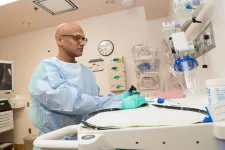(Press-News.org) Australia's and New Zealand's first set of clinical guidelines for children's head injuries has been created by a network of specialists based at the Murdoch Children's Research Institute (MCRI).
The guidelines, developed by the Paediatric Research in Emergency Departments International Collaborative (PREDICT) and published in Emergency Medicine Australasia, will allow emergency department clinicians to best diagnose and treat children's head injuries while reducing unnecessary exposure to radiation from CT scans. They also address head injuries in children with underlying problems, such as a bleeding disorder.
Matthew Salter took his son Jakob, 15, to the emergency department of a major hospital late last year after he knocked his head after a BMX crash.
"Jakob attempted to do a bike trick at one of our local BMX tracks but he mistimed the landing and crashed headfirst," he said. "When my wife and I arrived onsite, we found the visor on his helmet had been smashed off, he was distressed and I was worried he may have suffered a concussion.
"When we arrived at the hospital he vomited a few times so to rule out a head injury he received a CT scan and was observed overnight."
Under the new head injury guidelines, Jakob fulfilled several risk factors for a CT scan and observation.
Mr Salter said it was comforting to know these guidelines were in place to ensure all children received the same treatment regardless of where they lived in Australia.
Professor Franz Babl, MCRI Group Leader of Emergency Research, said Australia and New Zealand have not had a specific set of guidelines to help clinicians decide how best to treat individual children under 18 years who come to the emergency department with mild to moderate head injury.
"While we need to rule out any bleeding in the brain, we don't want to order CT scans unnecessarily, because it increases children's lifetime radiation exposure," he said.
"The lack of standardised guidelines meant children were receiving different care depending on where they were seen. Widespread uptake of these guidelines will change that."
Following an extensive search and assessment of international guidelines such as those used in Canada, the US and the UK, the PREDICT working group developed 71 recommendations and an imaging/observation algorithm relevant to the Australian and New Zealand setting. The new guidelines cover patient triage, imaging, observation versus admission, transfer, discharge and follow-up.
Head injury is one of the most common reasons for children to present to emergency departments.
In Australia and New Zealand about 10 per cent of children who present with head injuries of all severities have CT scans. Despite traumatic brain injuries being uncommon, persistent post-concussive symptoms affect more than a third.
Professor Stuart Dalziel, Cure Kids Chair of Child Health Research at The University of Auckland and paediatric emergency physician at Starship Children's Hospital in New Zealand, said identifying traumatic brain injury in children with seemingly mild injuries could be difficult and over the past 15 years had been a focus of research in emergency departments worldwide.
He said across Australia and New Zealand there had been a variation in practice in the management of paediatric head injury.
The PREDICT working group who developed the guidelines included emergency physicians, pediatricians, neurologists, neurosurgeons, radiologists, sports medicine doctors, neuropsychologists, GPs, paramedics and nurses.
The guidelines can be viewed at predict.org.au
INFORMATION:
Publication: Franz E Babl, Emma Tavender, Dustin W Ballard, Meredith L Borland, Ed Oakley, Elizabeth Cotterell, Lambros Halkidis, Stacy Goergen, Gavin A Davis, David Perry, Vicki Anderson, Karen M Barlow, Peter Barnett, Scott Bennetts, Roisin Bhamjee, Joanne Cole, John Craven, Libby Haskell, Ben Lawton, Anna Lithgow, Glenda Mullen, Sharon O'Brien, Michelle Paproth, Catherine L Wilson, Jenny Ring, Agnes Wilson, Grace SY Leo, Stuart R Dalziel on behalf of Paediatric Research in Emergency Departments International Collaborative (PREDICT). 'Australian and New Zealand Guideline for Mild to Moderate Head Injuries in Children,' Emergency Medicine Australasia. DOI: 10.1111/1742-6723.13722
*The content of this communication is the sole responsibility of MCRI and does not reflect the views of the NHMRC or the HRCNZ.
Available for interview:
Professor Franz Babl, MCRI Group Leader, Emergency Research
Professor Stuart Dalziel, Cure Kids Chair of Child Health Research, The University of Auckland
Matthew Salter and son Jakob who presented to hospital with a head injury
PITTSBURGH, 2 February, 2021 - Researchers seeking to develop on-demand and behaviorally congruent HIV prevention options for people who practice anal sex are reporting the results of three early phase clinical trials of rectal microbicides at this week's HIV Research for Prevention (HIV R4P) Virtual Conference. The Phase I studies, led by the U.S. National Institutes of Health (NIH)-funded Microbicide Trials Network (MTN), found both of two gel-based products well-tolerated, with higher doses of the active drugs likely required to provide protection from HIV and other sexually transmitted infections (STIs). The results are being presented ...
Hydrocarbons and petroleum are almost synonymous in environmental science. After all, oil reserves account for nearly all the hydrocarbons we encounter. But the few hydrocarbons that trace their origin to biological sources may play a larger ecological role than scientists originally suspected.
A team of researchers at UC Santa Barbara and Woods Hole Oceanographic Institution investigated this previously neglected area of oceanography for signs of an overlooked global cycle. They also tested how its existence might impact the ocean's response to oil spills.
"We demonstrated that there is a massive and rapid hydrocarbon cycle that occurs in the ocean, and that it is distinct from the ocean's capacity to respond to petroleum input," said Professor David Valentine(link ...
A new Veterans Affairs study finds that delays in undergoing colonoscopy following an abnormal stool test increase the risk of a colorectal cancer diagnosis and cancer-related death.
The results appeared online in the journal Gastroenterology in January 2021.
In a retrospective study of more than 200,000 Veterans, the researchers found that patients who received colonoscopy more than 13 months after an abnormal stool blood test were up to 1.3 times more likely to have colorectal cancer, compared with those who had colonoscopy up to three months after the stool test. Odds of an advanced stage of cancer at diagnosis were up to 1.7 times higher when colonoscopy was delayed beyond 16 months.
The findings also ...
The complex mechanics determining how galaxies spin, grow, cluster and die have been revealed following the release of all the data gathered during a massive seven-year Australian-led astronomy research project.
The scientists observed 13 galaxies at a time, building to a total of 3068, using a custom-built instrument called the Sydney-AAO Multi-Object Integral-Field Spectrograph (SAMI), connected to the 4-metre Anglo-Australian Telescope (AAT) at Siding Spring Observatory in New South Wales. The telescope is operated by the Australian National University.
Overseen by the ARC Centre of Excellence for All Sky Astrophysics ...
A combination of genetic mutations may explain the higher incidence of and poorer outcomes from pediatric leukemia in Hispanic and Latino children, according to Penn State College of Medicine researchers. They said a novel therapeutic drug combination - as well as testing for these mutations - may help address the disparity.
Hispanic and Latino children are between 1.2 and 1.75 times more likely to develop B-cell acute lymphoblastic leukemia (B-ALL), the most common childhood cancer, than non-Hispanic and Latino children. They also have a 40% higher death rate than their counterparts after correcting for socioeconomic factors. Dr. Sinisa Dovat, a researcher and pediatric ...
COLUMBUS, Ohio - People who start adulthood with a body mass index (BMI) in the normal range and move later in life to being overweight - but never obese - tend to live the longest, a new study suggests.
Adults in this category lived longer than even those whose BMI stayed in the normal range throughout their life. Those who started adulthood as obese and continued to add weight had the highest mortality rate.
"The impact of weight gain on mortality is complex. It depends on both the timing and the magnitude of weight gain and where BMI started," said Hui Zheng, lead author of the study and associate ...
According to the Barker hypothesis (Hales and Barker 1992) (also referred to as "small baby syndrome"), infants with too low body weight have an increased risk of suffering from cardiovascular diseases, high blood pressure, diabetes and chronic kidney diseases in adulthood. According to this hypothesis, fetal protective mechanisms enable adaptation to unfavorable intrauterine conditions (chronic oxygen or nutrient deficiency) and allow for fetal survival. At the same time, however, they lead to permanent structural and functional strains and changes into adulthood. The comprehensive study recently published in Nature Communications now clarifies central mechanisms of this phenomenon.
Fetuin-A plays a key role
Under the program of the Swiss National ...
ATLANTA - FEBRUARY 2, 2021 - A new study finds that long-term aspirin use before a diagnosis of colorectal cancer (CRC) may be associated with lower CRC-specific mortality. The report that appears in JNCI: The Journal of the National Cancer Institute, suggests that the findings for pre-diagnosis aspirin use might help reduce CRC mortality in the overall population by limiting metastatic spread of colorectal tumors before diagnosis. Preventing distant metastases leads to fewer deaths from colorectal cancer.
The study, led by Peter T. Campbell, PhD, of the American Cancer Society, used data from men and women enrolled in the American Cancer Society's Cancer Prevention Study-II (CPS-II) Nutrition Cohort who were cancer-free ...
A surgical procedure meant to counter ulcerative colitis, an immune disease affecting the colon, may trigger a second immune system attack, a new study shows.
The study results revolve around the immune system, the cells and proteins that destroy invading bacteria and viruses. Activating it brings about inflammation, responses like swelling and pain that result from cells homing in on the site of infection or injury. Autoimmune diseases like ulcerative colitis occur when this system mistakenly damages the body's own tissues.
Colon tissue damaged by the disease is routinely addressed with a "J-pouch" procedure wherein a pouch is surgically constructed from nearby, healthy ...
Toronto, ON - Results of a multi-centre, international, clinical trial co-led by Peter Munk Cardiac Centre (PMCC) cardiologist Dr. Dinesh Thavendiranathan point to the benefit of using a more sensitive test to detect heart function issues early, so cancer patients don't have to fight heart failure too.
Unfortunately, for 1 in 20 high-risk patients, treating cancer with certain therapies means the added potential of developing heart failure. The one-year results of the highly anticipated trial compared heart function at the end of anthracycline-based chemotherapy, a treatment that can successfully treat cancer but ...



